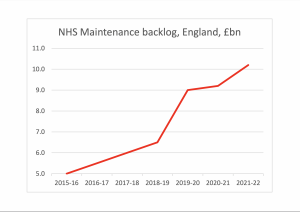The bill for “backlog maintenance” in England’s crumbling NHS has more than doubled in the past six years to a massive £10.2 billion, half of which is rated as either “high risk” or “significant risk.”
£1.8bn of the latest total is viewed as ‘high risk’. High risk failures are those that could lead to “catastrophic failure, major disruption to clinical services or risk of serious injury”. The annual ERIC (Estate Returns Information Collection) data also make clear that the backlog “does not include planned maintenance work (rather, it is work that should already have taken place).”
The total backlog has risen 11.5% in a year, and the new, tightening squeeze on NHS funding as Rishi Sunak’s new austerity regime kicks in will make matters even worse.
As the table shows the ten biggest deficits now account for a total of £3.5 billion – more than a third of the whole total.
Nine more hospital trusts face backlog bills between £100m and £143m (Newcastle upon Tyne Hospitals), adding another £1 billion to the grim total.
But many more trusts face major, less spectacular, issues as they battle to deliver safe and effective services to patients despite a dire shortage of capital to renew and repair buildings and equipment.
The most recent data includes two new entries to the ‘top ten.’ One is Manchester University Hospitals, where this year’s report includes significantly more sites then before, and the backlog at North Manchester General Hospital has now been included – at a massive £140m, two thirds of the Trust’s total backlog and almost enough to make the top ten on its own.
Hampshire Hospitals is the other trust to have vaulted in to the top ten, with a four-fold increase in ‘significant’ risk backlog in Alton and North Hampshire (Basingstoke) hospitals.
Hillingdon Hospitals, local to Boris Johnson’s Uxbridge and South Ruislip constituency, has again moved up the list with a deterioration in both its hospital sites, but most conspicuously the decline of Mount Vernon Hospital, where £35m of backlog is now ‘high risk’, along with £53m of backlog at Hillingdon Hospital. However the most recent data still shows a lower backlog than the £236m figure reported in 2019/20, which was used as a none-too subtle pretext to get a new Hillingdon Hospital added to the priority list on the infamous “Fake Forty” list of promised new hospitals.
It’s no surprise to find that the top of the backlog bills is once again Imperial Healthcare, the acute hospitals trust in North West London facing a soaring cost of resolving ‘high risk’ issues at St Mary’s Hospital (£123m), Charing Cross Hospital (£148m) and Hammersmith Hospital (£65m).
At the centre of the Guy’s and St Thomas’s backlog bill is £187m of “significant risk” issues at St Thomas’s Hospital, although the £462m total for 2021-22 is reduced from £562m two years ago.
Nottingham University Hospitals’ Queens Medical Centre needs £108m to remedy ‘significant risk,’ while in North West London the notoriously dilapidated Northwick Park Hospital needs £164m of work done, including £40m to tackle ‘high risk’ issues.
But with just £7.9bn capital allocated for 2022/23 to cover all of the various demands faced by NHS England, it’s clear that even the most serious problems will keep on being pushed further down the road as buildings decline and equipment becomes more obsolete.
It would be bad enough if the day to day delivery of services in tatty and crumbling buildings, using clapped out kit was just another frustration driving out more demoralised and burned-out NHS staff – but the fact that so many high risk dangers are growing worse rather than being dealt with also puts patients and the public at risk.
A government that genuinely cared about the NHS would see investment to correct these problems as a key component of any plan for growth as well as restoring the NHS to s service to be proud of. Sadly that’s not the government that has emerged from a summer of chaos and is now planning a new era of grimmer austerity.

Dear Reader,
If you like our content please support our campaigning journalism to protect health care for all.
Our goal is to inform people, hold our politicians to account and help to build change through evidence based ideas.
Everyone should have access to comprehensive healthcare, but our NHS needs support. You can help us to continue to counter bad policy, battle neglect of the NHS and correct dangerous mis-infomation.
Supporters of the NHS are crucial in sustaining our health service and with your help we will be able to engage more people in securing its future.
Please donate to help support our campaigning NHS research and journalism.


